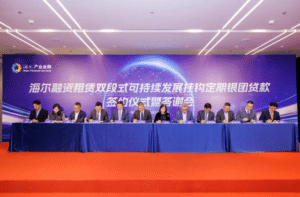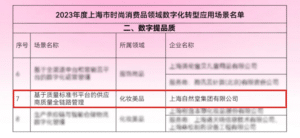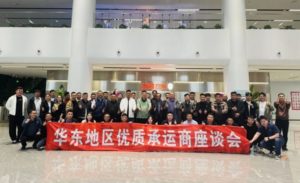The fifth report in the series “Toujiao Lecture Hall: Comprehensive Registration System, Reform to the Future”

[ad_1]
Host: Wang Yu Guest: Zhang Chi
Moderator: “Fortune Face to Face” – Investor Education Lecture. Recently, the China Securities Regulatory Commission and Tianjin Securities Regulatory Bureau have launched a comprehensive registration system and 315 investor education special activities with the theme of “comprehensive registration system, reform to the future”. Tianjin Securities Regulatory Bureau organizes professional cadres and practitioners to introduce and interpret for investors The registration system rules remind investment risks.
Today we invited Zhang Chi, head of the Tianjin Dagang Sales Department of CITIC Securities, to introduce investor suitability management and risk reminders under the comprehensive registration system. Hello, Mr. Zhang.
Guest: Hello host, audience friends
Moderator: In order to thoroughly implement the decision-making deployment of the Party Central Committee and the State Council on the full implementation of the stock issuance registration system, and to meet the needs of the full implementation of the stock issuance registration system reform, the Securities Association of China will further strengthen the self-discipline management of offline investors and maintain a healthy securities market. Issuance order, formulated the “IPO Securities Offline Investor Management Rules”, “IPO Securities Offline Investor Classification Evaluation and Management Guidelines”, “Beijing Stock Exchange Stocks Public Issuance and Listing to Unspecified Qualified Investors” Three self-regulatory rules in the Special Regulations on the Management of Offline Investors. At the same time, in order to correctly understand and apply the “Guidelines for the Classification, Evaluation and Management of Offline Investors in Initial Public Offerings of Securities”, the Securities Association of China has formulated a supporting document “Opinions on the Application of Self-Regulatory Rules No. Guidelines for Classification Evaluation and Management of Personnel > Applicable Opinions on Relevant Regulations. First of all, I would like to ask what are the requirements for the registration and management of offline investors?
Guest: Investors who want to register as an offline investor need to meet the requirements of securities investment experience, credit record, professional research and pricing capabilities, risk control and compliance capabilities, risk tolerance, offline inquiry and purchase business independence, and investment strength and other registration requirements.
For example: Investors and their self-operated investment accounts or securities investment products directly managed to participate in the offline inquiry and placement of IPO securities shall meet the conditions stipulated by the Association and complete the offline investors and securities placement objects in the Association. register;
Even professional institutional investors need to complete registration with the association before they can participate in offline new creation! What we need to pay attention to here is that after the comprehensive registration system reform, in addition to securities companies, fund management companies, insurance companies and the aforementioned institutional asset management subsidiaries, trust companies, finance companies, qualified foreign investors, and private equity fund managers who meet certain conditions Professional institutional investors such as investors can participate in offline new trading, and futures companies, among the ranks of institutional investors, can also participate in offline inquiry and placement. Among them, the futures asset management subsidiary is managed with reference to the private equity fund manager.
In addition, other legal persons and organizations (hereinafter collectively referred to as general institutional investors) and individual investors that meet certain conditions and legally established in China can participate in the offline inquiry and placement of IPOs on the main board after registration with the association.
In addition, the Association may also adjust the registration conditions for offline investors and allotment objects according to market conditions.
Moderator: What are the requirements for different types of investors to register as offline investors?
Guest: Here, it can be divided into three parts. Institutional investors, private equity fund managers, and individual investors.
Let’s see first. What are the basic conditions that institutional investors should meet to register as offline investors? Institutional investors must have rich experience in securities investment and trading. The operating time of the institution itself is required to be more than two years (inclusive), and the time to engage in securities trading at the same time is two years (inclusive). Of course, a good credit record and professional securities research and pricing capabilities are also required.
In terms of risk and compliance, it is necessary to develop business in accordance with laws and regulations, incorporate the participation in IPO securities offline inquiry and placement business into the overall compliance risk control system, and designate special personnel to strengthen compliance management and risk control. At the same time, they can independently bear investment risks. The risk tolerance level of general institutional investors should be C4 (inclusive) or above.
In terms of mechanism, institutions must have a sound system and mechanism for offline inquiry and placement business, and be independent when conducting offline inquiry and placement business of IPO securities.
Moderator: What are the conditions that a private equity fund manager must meet to register as an offline investor?
Guest: One is to complete the registration with the AMAC. In addition, you must have certain asset management capabilities. The total size of the products under its management registered with the AMAC should be more than 1 billion yuan (inclusive) in the last two quarters, and Among the products managed in the past three years, there is at least one product with a duration of more than two years (inclusive);
Moderator: Let’s focus on what are the conditions that individual investors must meet to register as offline investors?
Guest: From the subject point of view, individual investors should be Chinese citizens or foreigners with Chinese permanent residence status; they must also have rich experience in securities investment transactions, including but not limited to investors who have been engaged in securities transactions for five years ( (inclusive) or above, and have securities transaction records in the Shanghai and Shenzhen markets, at least one of the non-restricted stocks and non-restricted depositary receipts purchased from the secondary securities market in the last three years has been held for a consecutive period of 180 days or more;
Individuals must also have a good credit record and have no record of violating laws and disciplines or being subject to self-regulatory supervision. At the same time, individual investors must have strong risk tolerance and be able to independently bear investment risks, and their risk tolerance level should be C4 (inclusive); Independently carry out research and pricing of IPO securities, offline inquiry and subscription business;
Finally, individual investors should have professional securities research and pricing capabilities, have scientific and reasonable valuation and pricing methods, and be able to make investment decisions independently;
Moderator: Under the background of the comprehensive registration system, compared with the previous ones, are there any new revisions to the management requirements for offline investors?
Guest: There are some. In order to further regulate the behavior of offline investors, the “Rules” mainly put forward four specific requirements: as mentioned above, I will give you a brief summary:
One is staffing requirements: It is clarified that professional institutions and general institutional investors should be equipped with IPO securities research and investment business personnel, and have more than two years (inclusive) of equity asset research or equity and mixed product investment management experience.
Requirements for investment independence: Institutional investors should independently make investment decisions.
There are also compliance requirements: Institutional investors, especially private equity fund managers, should incorporate their participation in the offline inquiry and placement of IPO securities into the overall compliance risk control system, and designate specialized personnel to strengthen compliance management and risk control, and The work experience and professional requirements of the compliance management personnel for the offline inquiry and allotment business of the first issue of securities are stipulated.
Finally, the requirements for risk tolerance: refine the requirements for the risk tolerance of general institutional investors, and require their risk tolerance level to be C4 (included) or above.
Moderator: In order to cooperate with the reform of the comprehensive registration system, the China Securities Association has also formulated the “Guidelines for Classified Evaluation and Management of Offline Investors in Initial Public Offerings”, which includes all types of offline investors in all sectors of the securities market into classified evaluation Management system, establish a unified evaluation and management system mechanism for offline investors of first-listed securities applicable to the main board, science and technology innovation board and gem and other sectors, and continue to strengthen the management of offline investors, then please ask Mr. Zhang to share with us ” Has the Classification Evaluation and Management Guidelines been adjusted in those aspects?
Guest: Okay, no problem. The “Guidelines for Classification Evaluation and Management” mainly has the following three adjustments in terms of offline inquiry and purchase business requirements: First, to meet the needs of the comprehensive registration system reform, all offline investors will be included in the classification Evaluation and management system. The second is to simultaneously adjust the specific circumstances of being included in the attention and restriction lists, and strengthen the self-discipline management of offline investors. The association takes two months as a monitoring period. According to the monitoring results regularly provided by the stock exchange and the association’s public opinion monitoring clues, etc., the association forms an offline investor attention list, and publishes it through the offline investor management system. The validity period is two months. . The third is to optimize the application conditions for the selected list, emphasizing that offline investors of professional institutions should have certain active investment management capabilities.
Moderator: In addition to the above three aspects, does our “Management Rules” have other more detailed regulations on the behavior of offline investors? Can Mr. Zhang briefly share with us an example?
Guest: Of course! In terms of research and pricing basis, Article 25 of the “Management Rules” further specifies the pricing basis for institutional and individual offline investors, and clearly requires that the pricing basis for institutional investors should include fundamental research, profitability and financial status Analysis, valuation and pricing models, etc. The pricing basis for individual investors should include valuation and pricing methods, assumptions, descriptions of valuation parameters, and logical derivation processes. In addition, you like, Article 48 of the “Management Rules” regulates the behavior of offline investors, and also strengthens the requirements for compliance and risk control. In the case of timely payment, general institutions and individual investors have put forward requirements for the size of cash assets, requiring their allotment targets to have a fund balance at the end of the most recent month in the fund account opened by the securities company. 1‰ of the total assets at the end of a month, and the fund balance before the inquiry shall not be lower than 1‰ of the total assets of the securities account and capital account.
In addition, in order to guide offline investors to conduct business in compliance with regulations, reduce business operation risks, and continuously improve the standardization of quotation behavior, combined with the practical experience of offline investors’ self-discipline management, the “Management Rules” also restricts the prohibition of offline investors. Six supplementary additions were added: including false records, misleading statements or major omissions in the submitted information; obtaining illegitimate benefits by inflating the scale of assets through nested investments; Except for those subject to administrative permission; intentionally lowering, raising or not prudently quoting; not strictly performing the quotation evaluation and decision-making procedures, and/or having insufficient pricing basis; data files such as asset size reports submitted to the lead underwriter are inaccurate, inaccurate, etc. complete or inconsistent.
Moderator: It can indeed be seen that under the background of the comprehensive registration system, the code of conduct for investors is more stringent. Then I would like to ask Mr. Zhang. Compared with before, the punishment for some of our violations is now Is it also strengthened?
Guest: Yes, that’s right. The “Management Rules” stated that by extending the period for offline investors or placement targets to be included in the restricted list, the penalty for violations will be further increased. Offline investors or allotment objects under their management who have repeatedly violated the regulations can be included in the restricted list for a maximum of 36 months. At the same time, measures to deal with irregularities of investors under unqualified networks have also been added.
Moderator: After the implementation of the comprehensive registration system, a relatively popular term is “price cage”. Can you explain it to everyone?
Teacher Zhang: No problem. In fact, literally, “price cage” means to lock the price in the “cage” and return the pricing power to the real market, which is essentially to protect everyone’s investment interests.
I don’t know if you have noticed that in recent transactions, if the price quoted is too high or too low, the order will be rejected by the exchange. This is because of the “price cage” mechanism accompanying the comprehensive registration system reform.
After the comprehensive registration system reform, the main board began to implement the “2% price cage” mechanism. “2% price cage” means that the purchase order price shall not be higher than 102% of the purchase benchmark price and the higher value of the ten minimum change units of the purchase price above the purchase benchmark price; the sale order price shall not be lower than the sell price 98% of the benchmark price and the lower value of the ten minimum units of change in the declared price below the benchmark selling price. A simple interpretation is to add a 2% floating boundary to the purchase and sale declaration price. Before the reform, this boundary was 10%.
Moderator: I probably understand. Can Mr. Zhang give us an example for the audience?
Guest: Yes, for example, investor Xiao Le intends to buy A shares. If the current minimum selling price of A stock is 15 yuan/share (base price), the corresponding price range of the 2% price cage is 15 yuan * 2% = 0.3 yuan > 0.1 yuan, using the “2% price cage mechanism”, the small Le buy declaration shall not be higher than 15 yuan * 102% = 15.3 yuan / share.
Moderator: What are the restrictions on the selling price and buying price mentioned just now?
Guest: If the current minimum selling price of A stock is 4 yuan per share (base price), the price range corresponding to the 2% price cage is 4 yuan * 2% = 0.08 yuan < 0.1 yuan, and there are less than 10 minimum price change units, then If the price range of "10 minimum price change units" is applicable, Xiaole's purchase order shall not be higher than 4.1 yuan.
If Xiao Le intends to sell A stock, he needs to confirm the selling price range based on the lower value of 98% of the selling benchmark price of A stock and the 10 minimum price fluctuation units below the selling benchmark price.
Moderator: What role can the price cage play?
Guest: The price cage is set up to further expand the quotation space for low-priced stocks. For high-priced stocks, the price cage can well limit the sharp rise and fall of stock prices, reduce price shocks, and improve liquidity.
In addition, in addition to meeting the requirements of the “price cage”, the declared price must not exceed the price limit of the day! Under the comprehensive registration system, there is no price limit for new stocks listed on the main board for the first five trading days, and a 10% price limit will be returned from the sixth trading day.
Moderator: Thanks to Zhang Chi, head of the Tianjin Dagang Sales Department of CITIC Securities, for his detailed analysis of investor suitability management and corresponding code of conduct under the background of the comprehensive registration system, as well as the introduction of the “price cage”. This episode ends here first.
[ad_2]
Source link







